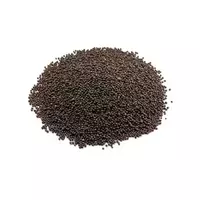Mustard black (french)

In addition to the scientific and official name of black mustard or Brassica nigra, there are a number of other names for the plant. Often black mustard is called French or real mustard. Mustard black (French) refers to annual plants of the Cabbage family. Usually mustard black (French) is native to tropical climatic zones in Asia and Africa. However, some subspecies of black mustard (French) are also found in our latitudes, as well as in Europe.
Although black mustard (French) is scientifically classified as cabbage plants, there is a resemblance in appearance to other representatives of the mustard plant species. The stem of black mustard rarely exceeds 100 cm in height. The leaves of the plant have a branched and spreading shape. Mustard French flowers with small inflorescences, which consist of flowers with bright yellow small petals. The fruits of mustard black (French) are pods, inside which there are rounded seeds small in size and dark brown almost black.
The Mediterranean region is considered the birthplace of black or French mustard. Currently, black mustard is actively cultivated in Italy, England, Turkey, France, as well as in India, Romania and China. On the territory of the Russian Federation, a wild or weedy species of black mustard grows. In most cases, the plant can be found on the banks of rivers or lakes, as well as in landfills and garbage. The chemical composition of black mustard (French) is used in the food and pharmacological industry. From the seeds of black mustard, essential and allyl-hill oil is obtained.
The exceptional benefits of black or French mustard for the human body are the content of natural compounds such as oleic, linolenic, erucal, palmitic and oleic amino acids. As a rule, essential oil, which is obtained from black mustard seeds, is used to make the popular Table Mustard sauce. It is from the seeds of black mustard that French culinary masters make Dijon mustard, famous for the whole world, with its exquisite taste and aroma.
Black mustard is considered an excellent honey plant. Honey, obtained by pollinating mustard flowers with black, has an exceptional taste and beneficial properties. In addition to honey and mustard oil, green leaves and mustard seeds of black (French) are used in cooking. For example, in the Caucasus, black mustard spice is used in the cheese making process. In medicine, powder from black mustard seeds is used for the production of mustard seeds. In addition, black mustard perfectly helps in the prevention and treatment of bronchitis, pneumonia, as well as rheumatism. In folk medicine, black or French mustard seed flour is used to improve digestion and appetite.
mustard black (French) 271 kCal
The energy value of mustard black (French) (Ratio of proteins, fats, carbohydrates - ju):
Proteins: 37.1 g (~ 148 kCal)
Fats: 11.1 g (~ 100 kCal)
Carbohydrates: 5.9 g (~ 24 kCal)
Energy ratio (bj | y): 55% | 37% | 9%
 Español
Español Français
Français Português
Português Русский
Русский 简体中文
简体中文 繁體中文
繁體中文 日本語
日本語 한국어
한국어 العربية
العربية Türkçe
Türkçe Қазақ
Қазақ Deutsch
Deutsch Italiano
Italiano Українська
Українська
